Repeated Warnings
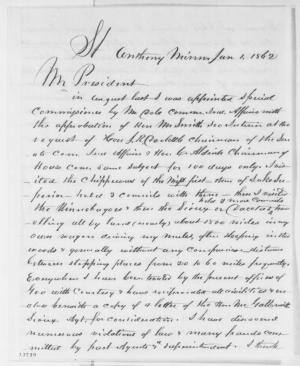 "...voluminous and outrageous frauds upon the Indians in Minnesota."
"...voluminous and outrageous frauds upon the Indians in Minnesota."
George E. H. Day, January 1, 1862
As unrest continued to build, so did warnings of war.
George E. H. Day was a special commissioner sent from Washington, D.C., to Minnesota in 1861 to report and recommend on the state of affairs between the Indians and the whites. Day reported back on what he considered was the fraudulent behavior of the traders towards the Dakota.
While Day was working at the national level, others tried to attract the notice of Minnesota's politicians. In a January 2, 1862, message to the Minnesota congressional delegation, missionaries Stephen Riggs and Thomas Williamson outlined abuses of power by traders and government officials, warning that inaction would guarantee a "collision with Indians on our frontiers."
Matters continued to worsen. On August 14, a group of New Ulm residents voiced their concerns in a strongly worded petition sent to Minnesota governor Alexander Ramsey. In it, the settlers described delays in payments to the Dakota, rumors of corruption in the state's office of Indian Affairs, and their fears that a war was imminent. An excerpt of their letter reflects the level of panic, fueled by fact and rumor, running rampant before the war.
That the payment for the Dacotah and Sioux nation of Indians has this year been delayed up to this time.
That said Indians considering said payment justly due to them and relying on the same for their subsistence, have become by such delay exceedingly exasperated, have committed several outrages and threaten to overwhelm these frontier settlements with Indian Warfare.
That your memorialists are in eminent danger to see their families massacred by said Indians, if the able bodied men of these settlements should be removed from here under the militia draft, before said Indians are appeased by receiving what is justly due them.
That the rumor has spread here far and wide that the United States Government has paid the money in gold for said Indians long ago, but that said money has been corruptly misapplied in speculations on the discount between gold and paper currency and otherwise by the Hon. Clark Thompson, Superintendent of the Indian Affairs in the State of Minnesota, and that this is the reason of the delay of the payment.
Dated August 14th, A. D. 1862
Of the 47 signers of this petition, two (Johan Schneider and Ernst Dietrich) were killed on August 18. A third (G. W. Otto Barth) was wounded August 23 and died shortly after.
Signers:
John G. Rudolph, John Manderfelt(d) A. Strecker, L. Brockmann, Johan Schneider, D. G. Shillock, Francis Erd, John W. Young, F. Beinhorn, Christian Prignitz, Carl Schmidt, Henry Behnke, Ernst Dietrich, H. C. Bergmann, ? Martin, S.C.?, Johan Bobleter, Johan ?, Aug. Friton, Stu Seiter, P. Scherer, C. Pfau, H. Loheyde, C. Schumacher, Fr. Rehfeld, H. Schalk, Fr. Wehrs, W. Galles, H. Kiesling, ? Kiseling, Pet. Jos. Schmitz, P. Hitz, Joseph Hitz, Louis Theobald, G. W. Otto Barth, Charles Roos, Jacob Muller, A. Claussen, Charles Frieberg, John C. Toberer, August Kiesling, Fredrich Immel, Franz Nolle, Friedrich Ring, Christoff Brockmann, John Hauenstein, Benjamin Heinebach.
"Records of the Interior show that warnings like Day's were sent from all over the United States. Unfortunately, they were so common by 1862 that the government was no more alarmed than the father of the little boy who cried, 'Wolf!'"—Carrie Zeman, historian; author, 2011
Theme:
1862Permissions beyond the scope of this license may be available at Copyright and Use Information.
Related Images
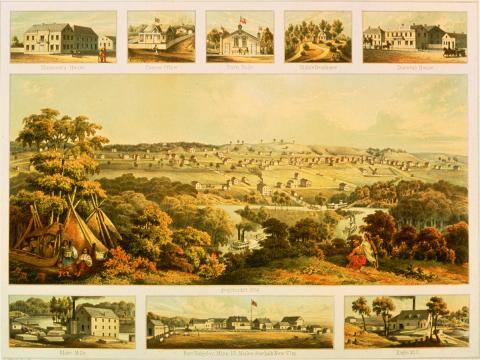
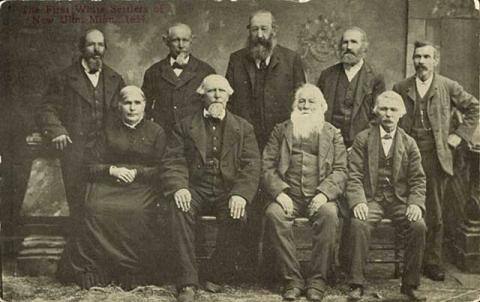
New Ulm, 1860
This is a painting of New Ulm, Minnesota, by Julius Berndt done in 1860. Founded in 1854 by an association of German-Americans called the Chicago Land Society, New Ulm became a haven for German immigrants. By 1860 the town’s population was 635 people, many of them recent immigrants who spoke little or no English and were not yet naturalized citizens. New Ulm was one of many towns founded during a tremendous influx of European settlers in Minnesota Territory. The 1850 territorial census recorded 6,077 non-Indian residents. By 1860, that number had grown to 169,654. Like many towns dotting the territory, New Ulm attracted immigrants who spoke the same language and held similar world views.
New Ulm attracted members of a German political party called the Turners. Nearby Milford Township was settled by Bohemian Germans, while members of the German Evangelical churches settled across the river in Renville County. Unlike fur-trade era settlers who relied on Dakota relationships for survival, newer settlers arrived in numbers large enough to make their communities tight-knit and self-reliant.
On August 14, a group of New Ulm residents voiced their concerns in a strongly worded petition sent to Minnesota governor Alexander Ramsey. In it, the settlers described delays in payments to the Dakota, rumors of corruption in the state’s office of Indian Affairs, and their fears that a war was imminent. An excerpt from their letter reflects the level of panic, fueled by fact and rumor, running rampant before the war:
That the payment for the Dacotah and Sioux nation of Indians has this year been delayed up to this time. That said Indians considering said payment justly due to them and relying on the same for their subsistence, have become by such delay exceedingly exasperated, have committed several outrages and threaten to overwhelm these frontier settlements with Indian Warfare. That your memorialists are in eminent danger to see their families massacred by said Indians, if the able bodied men of these settlements should be removed from here under the militia draft, before said Indians are appeased by receiving what is justly due them. That the rumor has spread here far and wide that the United States Government has paid the money in gold for said Indians long ago, but that said money has been corruptly misapplied in speculations on the discount between gold and paper currency and otherwise by the Hon. Clark Thompson, Superintendent of the Indian Affairs in the State of Minnesota, and that this is the reason of the delay of the payment.
Dated August 14th, A. D. 1862
Of the 47 signers of this petition, two (Johan Schneider and Ernst Dietrich) were killed on August 18. A third (G. W. Otto Barth) was wounded August 23 and died shortly after.
This photo is of the first white settlers of New Ulm, in 1854.
Related Documents
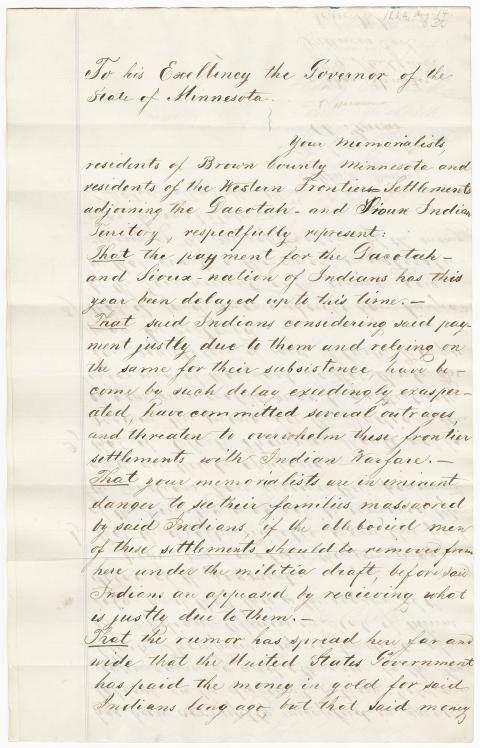

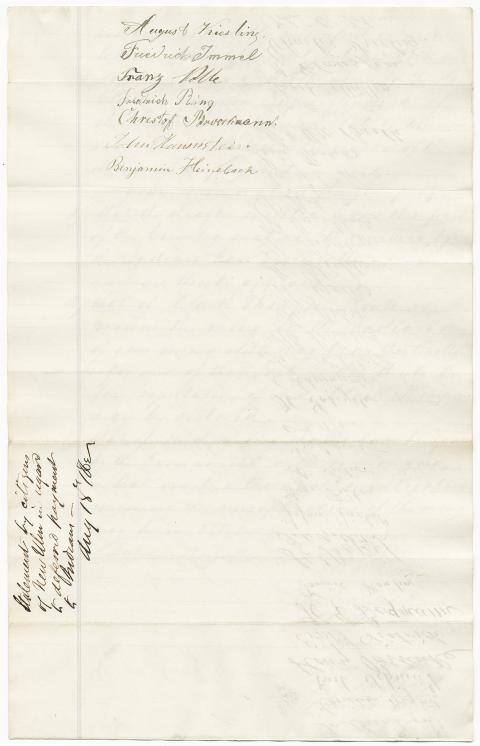
New Ulm Petition
On August 14, a group of New Ulm residents voiced their concerns in a strongly worded petition sent to Minnesota governor Alexander Ramsey. In it, the settlers described delays in payments to the Dakota, rumors of corruption in the state's office of Indian Affairs, and their fears that a war was imminent. An excerpt of their letter reflects the level of panic, fueled by fact and rumor, running rampant before the war.
That the payment for the Dacotah and Sioux nation of Indians has this year been delayed up to this time. That said Indians considering said payment justly due to them and relying on the same for their subsistence, have become by such delay exceedingly exasperated, have committed several outrages and threaten to overwhelm these frontier settlements with Indian Warfare. That your memorialists are in eminent danger to see their families massacred by said Indians, if the able bodied men of these settlements should be removed from here under the militia draft, before said Indians are appeased by receiving what is justly due them. That the rumor has spread here far and wide that the United States Government has paid the money in gold for said Indians long ago, but that said money has been corruptly misapplied in speculations on the discount between gold and paper currency and otherwise by the Hon. Clark Thompson, Superintendent of the Indian Affairs in the State of Minnesota, and that this is the reason of the delay of the payment. Dated August 14th, A. D. 1862 Of the 47 signers of this petition, two (Johan Schneider and Ernst Dietrich) were killed on August 18. A third (G. W. Otto Barth) was wounded August 23 and died shortly after. Signers: John G. Rudolph John Manderfelt(d) A. Strecker L. Brockmann Johan Schneider D. G. Shillock Francis Erd John W. Young F. Beinhorn Christian Prignitz Carl Schmidt Henry Behnke Ernst Dietrich H. C. Bergmann ? Martin S.C.? Johan Bobleter Johan ? Aug. Friton Stu Seiter P. Scherer C. Pfau H. Loheyde C. Schumacher Fr. Rehfeld H. Schalk Fr. Wehrs W. Galles H. Kiesling ? Kiseling Pet. Jos. Schmitz P. Hitz Joseph Hitz Louis Theobald G. W. Otto Barth Charles Roos Jacob Muller A. Claussen Charles Frieberg John C. Toberer August Kiesling Fredrich Immel Franz Nolle Friedrich Ring Christoff Brockmann John Hauenstein Benjamin Heinebach
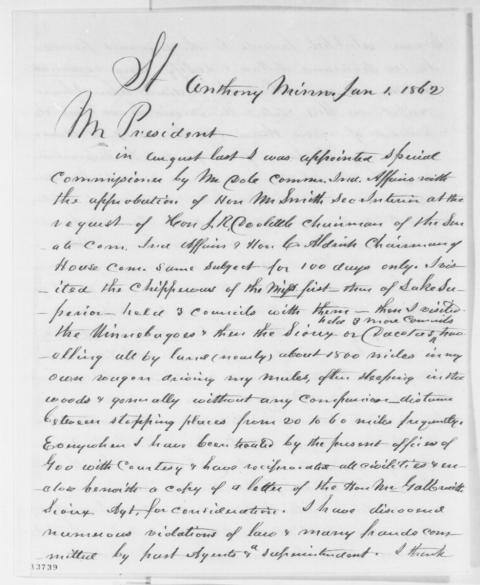
George E.H. Day to Abraham Lincoln
...voluminous and outrageous frauds upon the Indians in Minnesota.
George E.H. Day, January 1, 1862
A letter written by George E. H. Day on January 1, 1862. Day was a special commissioner sent from Washington, D.C., to Minnesota in 1861 to report and recommend on the state of affairs between the Indians and the whites.
Contemporary comment:
Records of the Interior show that warnings like Day's were sent from all over the United States. Unfortunately, they were so common by 1862 that the government was no more alarmed than the father of the little boy who cried, 'Wolf!'-Carrie Zeman, historian; author
Source: Abraham Lincoln Papers at the Library of Congress, Manuscript Division (Washington DC: American Memory Project 2000-02)
St Anthony Minn. Jan 1, 1862. Mr President in August last I was appointed Special Commissioner by Mr Dole1 Comm. Ind. Affairs with the approbation of Hon Mr Smith Sec Interior at the request of Hon J. R. Doolittle2 Chairman of the Senate Com. Ind Affairs & Hon. C. Aldrich3 Chairman of House Com. same subject for 100 days only. I visited the Chippewas of the Miss. first-- then of Lake Superior -- held 3 councils with them-- then I visited the Winnebagoes & then the Sioux or Dacotas held 3 more councils travelling all by land (nearly) about 1800 miles in my own wagon driving my mules, often sleeping in the woods & generally without any companions-- distance between stopping places from 20 to 60 miles frequently. Everywhere I have been treated by the present officers of Gov with courtesy & have reciprocated all civilities & enclose herewith a copy of a letter of the Hon Mr Galbraith4 Sioux Agt, for consideration. I have discovered numerous violations of law & many frauds committed by past Agents & a superintendent. I think I can establish frauds to the amount from 20 to 100 thousand dollars & satisfy any reasonable intelligent man that the indians whom I have visited in this state & Wisconsin have been defrauded of more than 100 thousand dollars in or during the four years past. The Superintendent Major Cullen,5 alone, has saved, as all his friends say more than 100 thousand in four years out of a salary of 2 thousand a year and all the Agents whose salaries are 15 hundred a year have become rich. The Indians are decreasing in numbers & yet their payments never increase but year after year have also decreased to each person & in the aggregate. The whole system is defective & must be revised or, your red children, as they call themselves, will continue to be wronged & outraged & the just vengeance of heaven continue to be poured out & visited upon this nation for its abuses & cruelty to the Indian. I most sincerely desire to aid Mr Dole & Hon Mr Smith in revising & perfecting the trade & intercourse laws & regulations with the cooperation such honest men as Judge Doolittle & others who desire that the placing of the Government in the hands of an honest man shall result in honest & free & humane dealings & transactions with the poor defrauded & degraded Indians of our frontiers. Here are a few of the words of the head Chief of Lake Superior Chippeways spoken at my Council Oct 22, 1861, last, "We send him our Great Father-- our profound respects-- We hope his heart is like the Great spirit all benevolence & that he will listen to our requests". At all my councils the Chiefs desire me to make many requests of their Great Father & tell him of many wrongs they had suffered from the Gov Agents and especially Traders the greatest Curse of the Indians and the Curse of the nation for they boast that they can control Congress & have done it Our Senator Rice6 is an old trader with two living indian wives & he has had, during the past administration, with which he was omnipotent, three old Indian-Traders appointed Agents. I never scarcely heard of an honest indian trader -- & then it is understood he is very liberally supported every way by the Traders The whole pack of traders & ex Agents & Superintendent are making war upon me because I have been looking up their frauds & rascalities & because they can neither frighten nor buy me-- each of those means having been ineffectually tried. I was at two of your receptions last summer desired to see you alone but knowing how overwhelmed with cares you was, never called. If I were not poor & had not a family to support I would go to Washington at my own Cost out of love of country & the poor indian. I have written to the Secretary of the Interior & Commr Dole & do not wish this referred to them-- but desire to be requested to go at Gov expense $135, would pay all I think as above stated I could save nearly as many thousands. A suggestion to Mr Dole or any Course you choose would accomplish it. The Indian Traders & Agents nearly if not quite controul our delegation in Congress except Mr Windom7 whom I consider an honest man neither to be bribed nor frightened-- sound as a rock I feel to trust a man who fears God I have the honor to be your obt servant Geo. E. H. Day Special Commr
